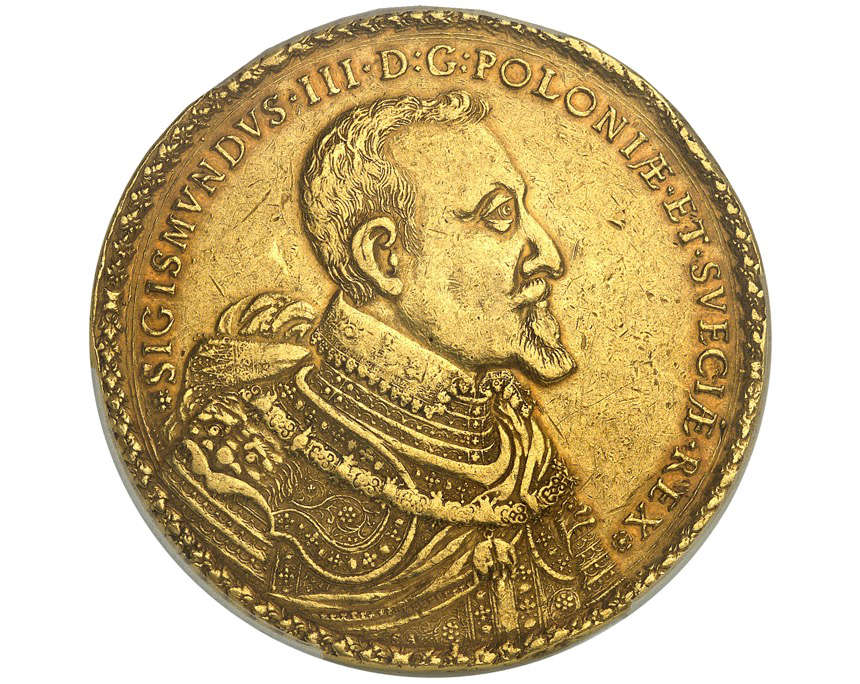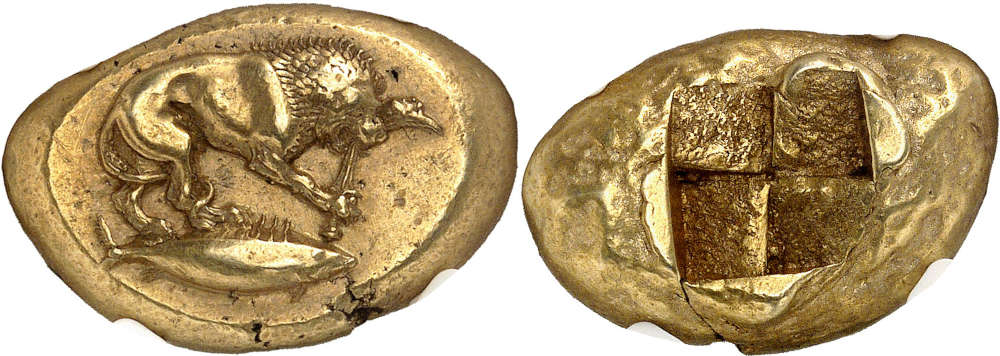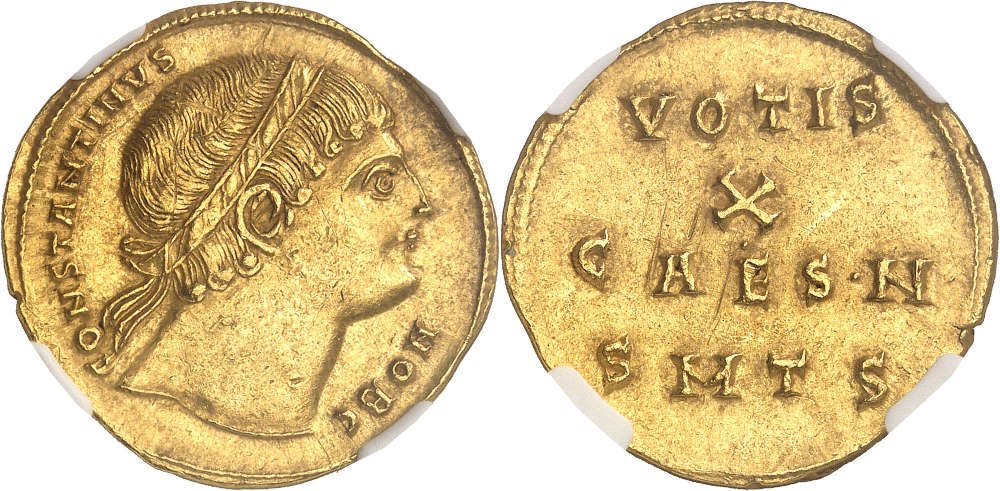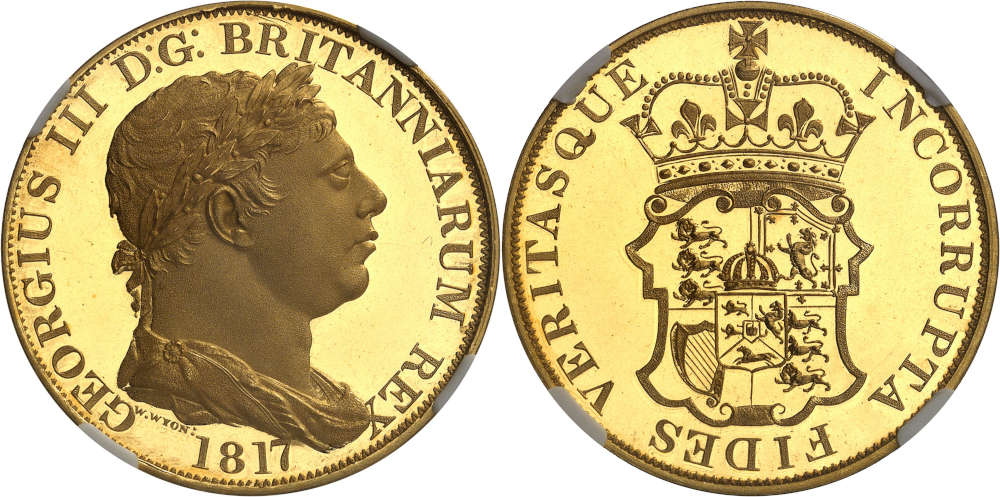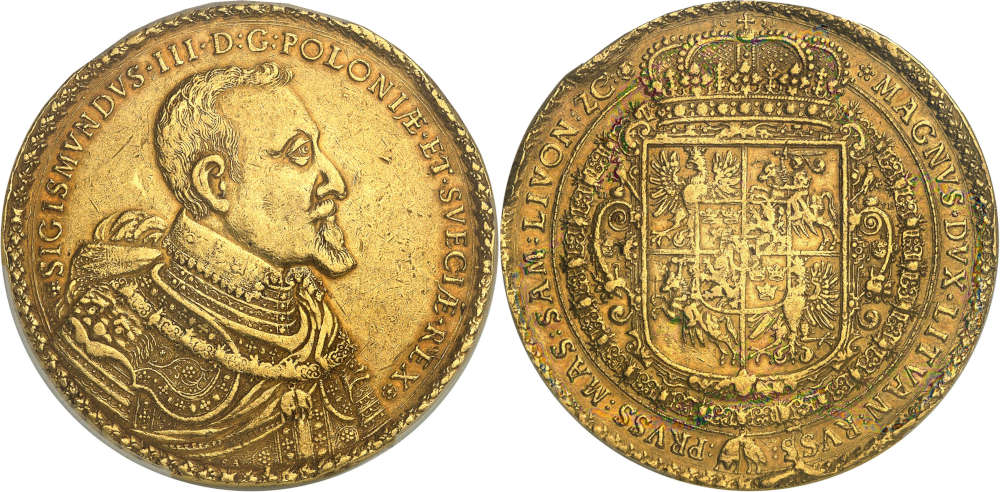MDC’s Auction No 14: High Quality Coins, Medals and Banknotes
MDC Monaco
Auction No. 14
Coins
3-4 May 2024
MC-Monaco
MDC Monaco announced their next numismatic auction n°14, which will take place at the Metropole Hôtel in Monaco, on Friday the 3rd, and Saturday the 4th of May 2024. The sale features over 1,700 lots carefully selected for their quality. It will be hold in four sessions:
- Lots 1 to 689 – First session, Friday the 3rd of May, 1:30pm – 7:00pm
- Lots 690 to 1012 – Second session, Saturday 4th of May, 9:30am – 12:00am
- Lots 1013 to 1515 – Third session, Saturday 4th of May, 1:30pm – 4:45pm
- Lots 1516 to 1726 – Fourth session, Saturday 4th of May, 5:00pm – 7:00pm
View some of the highlights of the sale:
Lot 23
Lot 23: Ancient Greece. Mysia, Cyzicus. Stater of electrum ND (500-450 BC), Cyzicus. Obv. Lion standing facing right, holding a sword in its mouth; below, a tuna facing right. Rev. Quadripartite incuse square. SNG France no 322; de Luynes No 2457; Von Fritze, Berlin, 1912, 177; Electrum, 16.01g, 15 x 22 mm, 12 h. NGC Ch XF 5/5 3/5 Fine style. Perfectly centered strike on a spectacular oblong flan. High reliefs for the lion and the tuna, lots of details. One of the most beautiful known examples. Starting price: 70,000 EUR.
According to the legend, Cyzicus would have been built by Cyzicus, son of Apollo or more likely by the Milesians, during the 7th century BC. Built on the coast of Mysia, on the Propontis (sea of Marmara), this city is a crossroads between the Euxine (Black Sea) and the Aegean Sea, between Europe and Asia, between Thrace and Asia Minor (Anatolia). Thanks to its location, Cyzicus was an important trading place and a tuna fishing place, which made it a flourishing city, well-known for its beauty and wealth. It was also an important cultural center, with a school of Mathematics, many historians, renowned architects and other specialists.
Lot 111
Lot 111: Roman Empire. Vitellius (69). Sestertius ND (69), Rome. Obv. A VITELLIVS GERMAN IMP AVG P M TR P. Laureate and draped bust facing right. Rev. L VITELL CEN – SOR II. Lucius Vitellius seated on a platform facing right. On the left, a man seated on another platform; at the bottom, three standing people, one holding the censor’s hand. RIC 134; Bronze, 24.72g, 34 mm, 6 h. From the Cantoni collection, P. & P. Santamaria sale, November 29th 1920, n°433 (Pl.X) then M. Ratto sale, 1939, then Prof. Angelo Signorelli collection, Part II, P. & P. Santamaria sale, Rome, June 4th 1952, n° 1231. Very rare type, with L. Vitellius, father of Emperor Vitellius, and one of the most distinguished senators under the reign of Claudius, on the reverse. Remarkable pedigree, covering more than a century! Dark patina in the hollows of the reliefs, with a majority of green concretions. Intact reliefs with a beautiful bust. Extremely fine. Starting price: 25,000 EUR.
Lot 125
Lot 125: Roman Empire. Trajan Decius (249-251). Double sestertius 249-251, Rome. Obv. IMP C M Q TRAIANVS DECIVS AVG. Radiate bust, draped and armored, facing right, three-quarter front view. Rev. FELICITAS SAECVLI / SC. Felicity standing facing left, holding a tall caduceus and a cornucopia. RIC.115c; C.39; Bronze, 39.01g, 36 mm, 12 h. From A. Hess AG and Bank Leu AG 41 sale, 24th and 25th April 1969, no 451. Very large module ! Bright green patina on the obverse, and a flawless brown-green patina on the reverse. Exceptional quality for this type. Extremely fine. Starting price: 15,000 EUR.
Lot 132
Lot 132: Roman Empire. Constantine II (337-350). Multiple or medallion of the weight of 2 solidi 327, Thessaloniki. Obv. CONSTANTINVS – NOB C. Diademed head facing right. Rev. In four lines: VOTIS / X / CAES. N/SMTS. RIC 166 (Berlin, same dies); C. 278; Gnecchi I, 26, 22, pl.8/8; Depeyrot (1995), p.154 = this exact coin; Gold, 8.78g, 26.5 mm, 12 h. From the Nelson Bunker Hunt collection, Sotheby’s New York sale, June 21th-22th 1990 n° 871. NGC CH XF 5/5 3/5 marks. Only 2 known examples with the one in the Berlin Cabinet ! Minimal marks and scratches, and a tiny notch on the rim at 4 o’clock on the reverse. Well-centered with a remarkable portrait. Extremely fine. Starting price: 100,000 EUR.
Constantine II was the eldest son of Constantine the Great and his second wife Fausta, born in 316. Constantine I wanted to establish his own dynasty and granted his son the title of Caesar when he was only one year old. This medallion is struck for its tenth anniversary. Using a style first seen under the reign of his father, Young Caesar is looking at the sky. Medallions or multiples were gifts offered by the Emperor to high-ranking personalities. In our case, the medallion would have been offered by the young Caesar himself. In 326, his half-brother Crispus is disgraced and executed, as well as Fausta, under unclear circumstances. In 327, Constantine II was named commander of Gaul, replacing Crispus.
Lot 173
Lot 173: Germany. Hamburg (imperial city of). Portugalöser of 10 ducats, to the unity of the four major banking cities of Europe (Amsterdam, Hamburg, Nuremberg and Venice), by J. Reteke, prooflike, 1677, Hamburg. Obv. QUATUOR HIS SIGNIS PYRAMIS AUCTA DOCET. Under God’s name, a view of Hamburg and its port with boats. In the foreground, on the left, Abundance with a cornucopia, under an arm emerging from the clouds and crowning it. On the right, a pyramid on an altar, decorated with armorial shields, surmounted by an angel blowing a trumpet; below HAMBURG. Rev. QUID PRUDENS CONCORS VIGILANS SOLLERTIA PRÆSTET. Facing allegories of Prudence, Concord and Vigilance, with their own attributes ; above radiating triangle ; below (date). Gaedechens 1609; Geschichte in Gold 88; Gold, 34.8g, 49 mm, 12 h. NGC MS 61 PL. Prooflike with very detached reliefs from the mirror fields. Beautifully fresh, with its mint lustre, barely burnished with micro-marks in the fields and a few micro-scratches explaining this pretty severe technical grade. Uncirculated. Starting price: 50,000 EUR.
The portugalöser, worth 10 gold ducats, comes from the large portuguese cruzados which were circulating a lot in Germany. The State was the only one authorized to strike coins, so banks for example in Hamburg, issued these portugalöser as medals, but with a monetary value (with very precise weights). Those portugalöser were used to transfer money, particularly between the cities of the Hanseatic League.
Lot 190
Lot 190: Germany. Prussia, Frederick William IV (1840-1861). Box containing 3 medals in gold, silver and bronze, First performance of Antigone by Félix Mendelssohn in Berlin, by C. K. Pfeuffer 1841, Berlin. Obv. Circular legend in Greek. Bust of Antigone with a beard, facing right; signature C. PFEUFFER FEC. Rev. A circular wreath of ivy, with medallions of Medusa, Ludwig Tieck, musical instruments and Felix Mendelssohn, surrounding a religious scene of a woman approaching an altar; below legend in Greek. Forrer IV p.475-476; Niggl 1303; Sommer P 72; Gold, silver and bronze, 278.12g, 145.25g and 142.8g, 63 mm, 12 h. NGC MS 62 (Gold), UNC DETAILS OBV RIM DAMAGE (Silver) and MS 62 BN (Bronze). The box is slightly worn, with some gaps. The medals have tiny marks on the edge (12 o’clock for the silver one) and the fields are barely burnished by fingerprints. Extremely rare set. Uncirculated. Starting price: 60,000 EUR.
The original box, imitating leather with romantic floral decoration, includes the three medals in gold (278.12g), silver (145.25g) and bronze (142.8g). Antigone, a character created by Sophocles, refuses her uncle’s and King Creon’s orders. He symbolizes the opposition to the established order in many artistic representations. Frederick William IV was considering Greek tragedy as a way to revitalize cultural life in Berlin and commissioned Antigone from Felix Mendelssohn, a conductor in Leipzig. The play was performed for the first time on October 28th 1841, which was very successful.
Lot 232
Lot 232 – Belgium. Leopold I (1831-1865). Module of 100 francs in gold, marriage of the Duke and Duchess of Brabant, Proof 1853, Brussels. Obv. LEOPOLD PREMIER ROI DES BELGES. Bare head facing left, below signature L. WIENER. Rev. L.L.PH. M. V. DUC DE BRABANT M. H. A. DUCHESSE DE BRABANT / 21-22 AOUT 1853. Attached busts facing right, below signature LEOP. WIENER. Fr. 6; Dupr. 538; Gold, 32.2g, 37 mm, 6 h. Top Pop: this is the finest known example! From Elsen 150 sale no 1256. PCGS PR64CAM. Proof. Irregular rim following the marking of the edge. In its mint state with mirror fields and matte reliefs. Beautiful light with mint lustre barely colored. Starting price: 30,000 EUR.
Lot 273
Lot 273: Cambodia. Norodom I (1860-1904). Pattern of four francs, without signature, on gold flan, Proof 1860, Brussels (Würden). Obv. NORODOM I ROI DU CAMBODGE. Bare head facing left, below (date). Rev. QUATRE FRANCS. Legend and coat of arms of Cambodia. Lec. 71a = this example; Fr. 2a; Gold, 24.95g, 34.4 mm, 6 h. Top Pop: this is the only graded example! From the Jean Lecompte collection. This is the coin illustrating the work of Jean Lecompte, Monnaies et jetons de l’Indochine française, published by Gadoury. PCGS PR65 (unfinished Proof) plate coin. Proof with unfinished fields showing traces of field polishing. Exceptional gold module, unique! Starting price: 60,000 EUR.
Lot 310
Lot 310: Cochinchina. Third Republic (1870-1940). Piastre de commerce pattern, Special Strike (SP) 1879, A, Paris. Obv. REPUBLIQUE FRANÇAISE. The radiant Republic, seated, facing left and holding a fasces; below signature BARRE and (date). Rev. COCHINCHINE FRANÇAISE / TITRE 0,900. POIDS 27,215. In a two branches’ crown: ESSAI / PIASTRE DE COMMERCE / (different) (mint) (different). Lec.28 = this example; Silver, 39 mm, 6 h. It is the third highest grade (3), only 1 example in 63+ and one in 65 are graded higher by PCGS. From the Jean Lecompte collection. This is the example illustrating the work of Jean Lecompte, Monnaies et jetons de l’Indochine française, published by Gadoury. PCGS SP63 plate coin. Special strike (SP) with the two anchors of the engraver Barre and ESSAI on the reverse. Low relief on the right thigh. Very few handling marks. Beautiful gray patina, dark on the obverse and showing golden reflections on the reverse. Uncirculated. Starting price: 25,000 EUR.
Lot 315
Lot 315: Republic of Korea: Kojong (1864-1897). Proof set including five coins of 5 yang, 1 yang, 1/4 yang, 5 fun and 1 fun, Proof Year 501 (1892). Obv. (value) and circular legend. In the center, two dragons facing each other. Rev. In a plant crown formed by two composite branches, under a mugunghwa flower, two words. KM.1114; Silver and bronze, 38 to 20 mm, 6 h. With the original box decorated with a mugunghwa flower (or Sahron rose) Proof. Cleaning traces. Starting price: 40,000 EUR.
Original set including five coins : silver 5 yang (26.91g; KM.1114, NGC PF 61); Silver 1 yang (5.41g; KM.1112); cupro-nickel 1/4 yang (4.58g; KM.1109, NGC PF 62, Second highest grade (2) !); bronze 5 fun (7.09g; KM.1106, NGC PF 62 BN, Second highest grade !) and brass 1 fun (3.59g; KM.1104, NGC PROOF DETAILS ENVIRONMENTAL DAMAGE).
Lot 341
Lot 341 – SPAIN Amadeo I (1870-1873). 100 pesetas, yellow gold strike, raised lettered edge JUSTICIA Y LIBERTAD 1871, M, Madrid. Obv. AMEDEO I REY DE ESPANA. Head facing right with signature L. M. on the edge of the neck; below *(date)*. Rev. LEY 900 MILLESIMAS 31 PIEZAS EN KILOG. / (different) 100 PESETAS (mint). Oval coat of arms surrounded by the Golden Fleece’s collar and set on a crowned mantle. Aureo & Calicó. 11; Cayon 17455 (25 examples); Fr. 340; Gold, 33.57g, 35 mm, 6 h. Original strike in yellow gold : very rare ! Small handling marks and hairlines in the fields. Tiny notches on the rims. Beautiful color, with reliefs barely satiny. Starting price: 100,000 EUR.
The 100 pesetas coin is the first to bear the modern denomination of “pesetas”, after centuries of striking 8 escudos and its divisions. Two dates are visible on the coin: in large numbers is the type approval date and in small numbers, in the stars surrounding the large date, the date of minting. A royal decree, in January 1871, specified the legend of the edge: Justice and Liberty. The Amadeo’s 100 pesetas was struck according to the decree of the Treasury Department of August 22th 1871, and started with only a dozen original examples in yellow gold, of which six to eight examples would be known today.
Lot 374
Lot 374: France / Royal. Philippe VI (1328-1350). Gold crown ND (1340). Obv. + xPHx DIx GRAx REXx FRANCx. Royal crown surrounded by six lilies. Rev. + °XP’C: VINCIT: XP’C: REGNAT: XP’C: IMPERAT. Cross with leaves and acorns, a quadrilobe in the center, branchs separated by four crowned lilies, in a polylobe surrounded by clovers. Dy. 252; Fr. 275; Gold, 5.38g, 30.5 mm, 2 h. PCGS MS62. Very few circulation wear with the flan barely bent. Beautiful golden color. Uncirculated. Starting price: 30,000 EUR.
Lot 377
Lot 377: France / Royal. Philippe VI (1328-1350). Florin Georges, 1st issue ND (1341), Angers. Obv. (lily) PHILIPPVS: DEI – GRA’ – :FRACOR’: REX. Saint George riding a horse facing left, helmed and armored, carrying a crossed shield and holding a spear that he plunges into the mouth of the dragon terraced at the horse’s feet; field of lilies; the whole scene in a polylobe interrupted at the top and the bottom. Rev. + XP’C: VINCIT: XP’C: REGNAT: XP’C: IMPERAT. Cross with florets, quadrilobe in the center, in a quadrilobe decorated with leaves and separated by four lilies. Dy. 257; Fr. 272; Gold, 4.7g, 28.5 mm, 9 h.The flan is pretty wide and the strike is well-centered, very discrete double strike on the obverse. Beautiful golden color. Rare. Starting price: 50,000 EUR.
Lot 933
Lot 933: Great Britain – United Kingdom. James II (1685-1688). 5 guineas, 1st bust, with elephant and castle 1687, London. Obv. IACOBVS. II. – DEI. GRATIA. Laureate head facing left; below (different). Rev. MAG. BR. FRA. ET. HIB. REX (date). Cross composed by four crowned shields containing arms, and flanked by four scepters. S.3398; GH 43 (38 examples, finest MS61+); Bull. 312; Fr. 293; Gold, 41.71g, 37 mm, 6 h. Top Pop: this is the most beautiful graded example ! With the elephant and castle, indicating that the metal came from the Royal African Company, one of the oldest British colonial companies established in Guinea. Prestigious pedigree : H. Montagu Collection, Sotheby’s sale, London, November 1896, n°842, sold as coming from the W. Brice collection (purchased in bulk by H. Montagu); then B.M.S. Roth Collection, Sotheby’s sale, London, July 1917, n°349; then Lieutenant-Colonel T. G. Carter’s collection, purchased by Spink, London, in 1936; then Dr. E. C. Carter’s collection, purchased in bulk by Baldwin, London, in 1950 and sold in 1951 (£125); then, Slaney collection, Spink 3024 sale, London, May 2003, n°70 and finally private collection (Sincona British Collection). NGC MS 63. Raised lettered edge: +. DECVS. ET. TVTAMEN. ANNO. REGNI. TERTIO. Exceptional strike, remarkable force and well-centered, the reliefs perfectly raised. Close to mint state, the original shine barely browned in the fields by a patina with orange tones. Exceptional and spectacular. Uncirculated. Starting price: 200,000 EUR.
Lot 944
Lot 944: Great Britain – United Kingdom George III (1760-1820). Gold pattern of the crown “INCORRUPTA”, by W. Wyon, Proof 1817, London. Obv. GEORGIUS III D: G: BRITANNIARUM REX. Laureate bust with draped collar facing right; below signature W. WYON and (date). Rev. INCORRUPTA FIDES VERITASQVE. Scalloped and crowned shield, with arms of England, Scotland, Ireland and England, crowned shield of Hanover in the center. Bull. 2030; Esc. 230; KM# PnC77; WR.208; Gold, 48.69g, 38 mm, 12 h. Top Pop: this is the only graded example! From a Stack’s sale, January 14th 2008, no 2927 and previously DNW, September 2005, no 875 and SNC, December 1996, no 6009. NGC PF 65 ULTRA CAMEO. Proof and ultra cameo. Medal strike. The reliefs are matte with a grainy texture, creating a beautiful effect in strong contrast with the glossy and uniform mirror fields. Tiny hairlines. Exceptional rarity. A unique opportunity to acquire one of the most spectacular coin of British numismatics. Uncirculated. Starting price: 350,000 EUR.
William Wyon was born in 1795, son of Peter Wyon, and nephew of the chief engraver Thomas Wyon Sr. He began his career as an engraver in 1812, at only 17 years old, with a medal for the Society of Arts. In 1815, he created the great seals of Scotland and Ireland. In 1817, he joined the Royal Mint with his cousin Thomas Wyon Jr as second engraver. In 1817, the English government issued a new silver Crown and a new gold coin, the Sovereign. Produced in the new presses of the London mint, the type for those coins is Saint George slaying the dragon. The dies are the work of an outstanding Italian gem engraver, Benedetto Pistrucci. In 1816, when the project was launched, the young William Wyon proposed his model struck by the Royal Mint at only 18 examples in silver and 7 examples in gold. The reliefs of this pattern are treated in dotted lines, like the creations made for Cromwell. The bust is large and realistic, with great finesse. The Latin legend on the reverse INCORRUPTA FIDES VERITASQUE “An Intact Faith” can be understood as the faith of the country towards its sovereign, often considered as a mad man but who nevertheless knew how to get his country out of long military conflicts. However, the project proposed by Pistrucci was ultimately chosen, which also allowed him to become chief engraver. To become chief engraver himself, Wyon had to wait another ten years, until 1828.
Lot 962
Lot 962: Great Britain – United Kingdom Victoria (1837-1901). Crown or Gothic Crown, Proof 1847, London. Obv. VICTORIA DEI GRATIA BRITANNIAR. REG. F: D. in Gothic letters. Crowned bust of Victoria facing left. Rev. (starting at 9 o’clock) TUEATUR UNITA DEUS / ANNO DOM MDCCCXLVII. Cross composed by four shields separated by four flowers. S. 3883; Esc. 2571; Silver, 39 mm, 6 h. PCGS PR65CAM. Raised lettered edge with 3 ferrules: (crown) DECVS * ET * TVTAMEN (crown) ANNO * REGNI UNDECIMO. Proof with cameo. Very nice patina with a satin bust. Proof. Starting price: 50,000 EUR.
Lot 1172
Lot 1172: Indochina. Third Republic (1870-1940). Pattern of the piastre, smooth edge, strike without ferrule, Special Strike (SP) 1921, San Francisco. Obv. REPUBLIQUE FRANÇAISE. The radiant Republic, seated facing left and holding a fasces; below signature BARRE and (date). Rev. INDO-CHINE FRANÇAISE / TITRE 0,900. POIDS 27 GR. In a two branches’ crown: PIASTRE DE COMMERCE. Lec.295 = this example; Silver, 42 mm, 6 h. Top Pop: this is the only graded example! From the Jean Lecompte collection and previously the A. Salles Collection, É. Bourgey, July 1st-2nd 1929, no 219 (illustrated plate III). This is the example illustrating the different editions of Jean Lecompte’s work published by Gadoury. PCGS SP63 plate coin. Special strike as proof, no ferrule, from the San Francisco workshop. With a slightly shiny gray patina. Uncirculated. Starting price: €30,000.
Lot 1254
Lot 1254: Italy. Umberto I (1878-1900). Gold Medal, Umberto I of Savoy ascends the throne, by Speranza 1878, Rome. Obv. UMBERTO I RE D’ITALIA – MARGHERITA DI SAVOIA REGINA. Bust attached facing left, the King with bare head, and the Queen laureate with an oak branch; below signature SPERANZA. Rev. QUESTA E’ LA FEDE DELLA MIA CASA QUESTA SARA’ LA MIA FORZA. In front of the throne where his helmet is placed, the King is standing, facing left, swearing on the constitution. In the background, in the nimbus, Carlo Alberto di Savoia and Vittorio Emanuele II as well as a Victory resting on the shield of Savoy and wearing a laurel wreath. Below: XIX GENNAIO MDCCCLXXVIII and signature SPERANZA. Comandini 1878, p.709; Martini cf. 3117; Forrer V p. 599; Gold, 243.63g, 69 mm, 12 h. From Asta Finarte sale 786, May 7th to 9th 1991, N°805 (illustrated on the catalog’s cover). NGC MS 61. Special strike. Minimal scratches on the reliefs and hairlines in the mirror fields. Spectacular. Very rare in gold. Uncirculated. Starting price: 30,000 EUR.
Lot 1335
Lot 1335: Poland Sigismund III Vasa (1587-1632). 80 ducats 1621 SA / II – VE, Bromberg (Bydgoszcz). Obv. * SIGISMVNDVS* III* D: G: POLONIÆ* ET* SVECIÆ* REX*. Armored bust, bare head wearing a lace collar and a sash, adorned with the Golden Fleece’s order. Below : signature S. A and small (date) behind the bust. Rev. * MAGNVS* DVX* LITVAN: RVSS: – :PRVSS: MAS: SAM: LIVON: ZC’:*. Quartered shield with arms of Poland at 1 and 4 (crowned eagle) and of Lithuania at 2 and 3 (galloping rider facing left, raising a sword and holding a shield), with shield of Sweden in the center, quartered with arms of Sweden at 1 and 4 (three crowns) and Gothie at 2 and 3 (crowned lion), with shield of Wasa in the center (sheaf). The whole shield crowned and surrounded by the Golden Fleece’s collar; above (date). Fr. –; KM. F43; Hutton-Czapski –; Kopicki. 1443; Kaminski. 1768; Dutkowski. 95; Kaleniecki p.106 (this example); Jasek coins A/A; Gold, 282.54g, 69 mm, 12 h. Top Pop: this is the only graded example! From the Clifton-Wild collection acquired during Stack’s sale of December 1995, no 820; previously from the Crédit de la Bourse sale, April 1992, n°806 and previously from the Julian Ursyn Niemcewicz collection and maybe from the Virgil Brand collection (who owned a 70, an 80 and a 100 ducats coins) PCGS AU50. Light and regular wear on reliefs with small handling marks in the fields. Beautiful golden reflections around the reliefs. Impressive, majestic bust. Exceptional museum coin! Almost uncirculated. Starting price: 1,300,000 EUR.
By Samuel Amman, engraver (SA) and Jakub Jakubson von Emden (II-VE), director of the Bromberg mint. Amman previously worked at the Danzig mint from 1610 to 1613, where his engravings were very neat. Exceptional in its size and beauty, this prestigious strike was probably created after the Battle of Khotyn during which the Polish-Lithuanian, who were catholics, defeated the Ottoman, who were muslims. It was the first major victory marking the end of the Ottoman expansion.
Lot 1499
Lot 1499: Vietnam. Annam, Khài Dinh (1916-1925). Gold 20 tiên (2 lang or 2 ounces) ND (1916-1925). Obv. Surrounding a flaming pearl, a large dragon, head down and tail curled in a radiant sun on top ; on the right: Khài Dinh thông bao “Current currency of Khài Dinh” and on the left: Van thê vinh lai “Every generation will reap its fruit forever”; to the left and right, clouds. Rev. In Chinese characters (Hanzi), a quatrain “The precious stone khuyet and cinnabar in a thousand years are changed into very pure gold transmissible to ten thousand generations. That way, we recognize merit and we highlight virtuous men, because only wisdom is precious.” KM. –; Jewels –; Fr. –; Gold; 74.2g; 56 mm; 12 h. With suspension holes at 12 and 6 o’clock (a forged ring attached to the 6 o’clock hole). Exceptional module, weighting 2 gold ounces, and type, with the dragon descending on the obverse. The largest module for Thanh Thai is only one ounce (Schroeder 431, with a square hole). This example, intended for the King or a high dignitary, has been worn (the ring is at the bottom) and has a slightly cleaned appearance. Very rare, probably unique! Extremely fine. Starting price: 50,000 EUR.




